- Home
- A. S. Byatt
Babel Tower Page 19
Babel Tower Read online
Page 19
Their discussion of the future is horribly complicated by the presence of Leo, who sits beside Frederica on Alexander’s linen sofa and leans his body into hers, as though two could become one. Frederica looks ill. Tony says she must see a doctor. He is already thinking in terms of divorce: he thinks there must be a medical record of the wound, now, but cannot say so.
“It isn’t too bad,” says Frederica.
“It’s bad enough,” says Tony. “I can see you are in pain.”
Alexander pours coffee for everyone from his blue coffee-pot. He remembers pouring coffee for Daniel Orton from this pot on his arrival in London after his flight from Blesford. He thinks: I am a person to whom people persist in coming for help, despite the fact that I am not helpful, I am not useful, I am not kind and concerned.
It is Hugh Pink who says directly to Frederica, “What do you want to do?”
Frederica puts an arm round Leo’s head, an embrace which also half-muffles his ears.
“I can’t go back. That’s certain and might as well be said.”
Leo’s lips tighten. He does not speak.
“I need a place to be quiet, and think. I need work. I must be independent.”
Everyone looks at Leo.
“We shall have to think it out step by step,” says Frederica. “I need somewhere now where I can be with Leo. Later—Leo must think—”
“I do think,” says Leo. “I want to come. You want me to come, you do. I know you do. You do want me to come.”
“Of course I do,” says Frederica. “Only—”
She thinks of his pony, his settled journeys from kitchen and paddock, his little world. She thinks of starting her “career” with a small and anxious boy to look after.
“Only—” repeats Leo, his face quivering.
“Only nothing. We’ll find somewhere. Something.”
Alexander says, “I have an idea. It might even be a very good idea. What about Thomas Poole? He is living by himself—well, by himself with his children—in the Bloomsbury flat I used to lodge in. His wife left him. She went off with the actor, Paul Greenaway, who was Van Gogh in my play. He has two teenage boys and a girl who is about twelve, and a little boy, Simon, who is eight, who is bigger than Leo. He runs the Crabb Robinson Institute for Adult Education—he could almost certainly find some classes for Frederica to teach—it’s a way of making part-time money that many women find helpful—he’s got space in that huge flat—he might help out. No one would think of looking for anyone there.”
“I liked him.” Frederica remembers Poole, a colleague of Alexander and her father at Blesford Ride School. “He was good as Spenser in your play.” Both Frederica and Alexander remember, and do not mention, Thomas Poole’s affair with the beautiful Anthea Warburton, herself then, like Frederica, only a schoolgirl, which had ended in pregnancy, abortion, and grief. The grief, Frederica remembers, had seemed to be more Thomas Poole’s. But appearances can be deceptive.
“If part-time teaching is a good thing,” says Alan Melville, “I can find you a few hours immediately at the Samuel Palmer School. Now the artists have a degree course, they have to study things other than art, and we teach them literature. It’s quite interesting.”
“And I could ask Rupert Parrott about proof-reading and writing reports on books,” says Hugh. “It’s dog’s-bodying, but it can be done at home. It’s a way in, to that world.”
“And there’s Wilkie’s television game,” says Tony. “And you could try to get some reviewing. That isn’t easy, but you could do it—”
“Work,” says Frederica, “I need work.”
“And then,” says Tony. “We can think out the rest. What you will do. In the long run.”
“We can,” says Frederica.
Alexander, Frederica and Leo arrive at Thomas Poole’s flat. This is a large, Edwardian mansion flat in Bloomsbury, on the sixth floor. Alexander lodged here in the late fifties when he was working on The Yellow Chair. Poole’s wife, Elinor, left suddenly in 1961 to join Paul Greenaway, who was playing in a revival of Pygmalion in New York. The Pooles’ four children, Chris, Jonathan, Lizzie and Simon were then fourteen, twelve, nine and five. They are now seventeen, fifteen, twelve and eight. The two elder boys are at Blesford Ride, where Alexander and Thomas met as teachers under Frederica’s father. Alexander still thinks of them as little boys, but Chris is already working for university entrance. He asks after them as Poole shows them into his living-room, which was once Alexander’s bedroom. It has a big, corner bay-window, out of which can be seen, like a rocket landed from another world, the discs, dishes, turrets and antennae sprouting from the column of the new Post Office Tower.
It is not possible to discuss Frederica’s future in front of Leo, and it is still impossible, it seems, to detach Leo from Frederica’s side. He sits beside her on a pale Swedish sofa and twists his hand into the fold of her skirt. A young Austrian woman appears, Waltraut Röhde, with brown curls, a sweet petal face and weighdess bird-bones. Her smile is confidently shy. She tells them Lizzie is swimming, and Simon is in his room. She tells Leo she is bringing tea and chocolate torte. “Torte?” says Leo. “Keck,” says Waltraut. “Cake. I made it. It is good.”
Frederica looks round her. The walls are lined with books. She gives a little sigh. Thomas asks after her father; Frederica says she has not heard from him; Alexander says he has had several communications, because of the Steerforth Committee. “He is in his element,” says Alexander. “He has his grandchildren, his house on the moors, his evening classes. We were all afraid for him, when his occupation was gone. And he is in his element.”
Waltraut returns with a tray of teacups, and again with the chocolate torte. The chocolate torte attracts Simon Poole, who is a leggy boy with a delicate neck and shining straight brown hair flopping over his brow. He is shy, but courteous, and greets everyone. Waltraut tells Leo that Simon wishes to show him his railway. Simon agrees to this in a friendly mutter. Waltraut, whose English is more resourceful than her accent might suggest, tells Leo it has three separate tracks, a turntable, two stations and a Pullman coach. Simon says, “I’m making a new points system.” Maybe because both Waltraut and Simon are so patently gentle and harmless, maybe because he is tired of gripping, maybe because the chocolate has soothed his brain, Leo allows himself to be led away. Frederica finds her hands are shaking. She tells the two friends in a rush that she can’t talk in front of Leo, that she can’t ever go back to Leo’s father, that she must have work, she must start her life again, that she cannot think what should happen to Leo. “I can’t go back, I can’t keep him, I can’t send him back. I can’t think,” says Frederica to Thomas and Alexander, who look at her with concern and affection.
Thomas proposes, as Alexander had hoped, that Frederica should for the time being come to live in the flat. There is room, at least whilst the big boys are away at school. He, Waltraut and Frederica can look after Lizzie and Simon and Leo, and also do their own work. He can, in fact, offer her at least one evening class at the Crabb Robinson Institute, since one of his teachers is having a difficult pregnancy and has been ordered to rest. It is on “The Development of the Novel Form” or something like that. “I think I know you well enough to know you could make a go of it,” says Thomas Poole, adding, perhaps unfortunately, “It must run in the blood, I should think.”
“I always said I would never teach,” says Frederica.
“We all said that,” says Alexander.
“It is only a suggestion,” says Poole.
Frederica looks round at the books.
“No,” she says, “I’m not turning it down. I feel like Simon and Leo with that chocolate cake. Greed. Pure greed.”
But her face, when she says that, does not, Alexander thinks, have quite the old rapacity.
Thomas asks Alexander how his work on the Steerforth Committee is going. Alexander says that he is absorbed by it and that everyone else appears to feel the same. They are worried that if there is a change of governme
nt at the Election, now imminent, they might be disbanded. He finds it interesting, he says, partly because he likes to watch the group at work as a group—the formation of alliances and conflicts, the little eddies of passion and incomprehension. The committee is very thorough: he has visited, or will visit, schools in villages and city centres, prosperous suburbs and agricultural fens, schools for infants and schools for teenagers. Anyone’s idea of teaching and learning, he says, looking for confirmation at Poole’s thoughtful face and Frederica’s drawn one, comes from his own early experience of being taught. “And I suppose we all thought life was somewhere else, not in the classroom, that was the essence of it.” He remembers, he summons up, a pervasive smell of trapped boredom, of brown linoleum and dusty windows, of slow, slow-ticking clocks and scratches and splutters of intransigent ink. And within this sea of brown air and chalky ennui a few moments of vision: a theorem coming out just so, a chorus ending from Euripides, Hamlet saying “Words, words, words.” He can still catch that feeling, he says, on the visits to secondary schools. But in the primary schools there has been nothing less than an explosion of a new sense of what children are and can do. He has a sense sometimes, he says, that he and his fellows are like Alice, travelling in a brighter world Underground or through the Looking Glass. He has seen such things—such brilliant paper forests hung with poems and painted birds, such cardboard towers, such purposive hurrying and constructing and experimenting … He has talked to the experts in language acquisition and learning psychology on the committee and now knows that small children are miracle-workers of sentence-construction ex nihilo, and that once we understand this we need not drill, or force …
“It is all very exciting, certainly,” says Thomas. “But there may be sufferers for all this ferment of activity. Simon, for instance, my own son, Simon. I think he’s a natural quiet boy in a corner. But they are always saying he doesn’t relate to other children …”
“He seems a bright boy, to me,” says Alexander guardedly.
“I think so. But maybe he is emotionally disturbed, more than I think. I’ve tried to compensate for his mother’s absence—”
Alexander’s crest falls. He is almost sure that Simon, Simon Vincent Poole, is his son, and not Thomas Poole’s son. Simon’s mother, Elinor, was also almost sure, and took some pleasure, at the time of Simon’s birth, in explaining to Alexander the exact degree of her almost-certainty. Since then, Simon’s existence has been a constant preoccupation of Alexander’s. When Simon was very small, and Elinor was still at home with the children, Alexander experienced him as a threatening problem, an extension of Elinor’s emotional raids on his peace, which were alternately seductive and more or less sneering. He feared for his friendship with Thomas, which mattered to him, and which he had managed to sustain. Then, after Elinor’s departure, he had had a bad few months thinking, as a moral conundrum, about Simon’s hypothetical position, with a father who was not his father, and a mother departed. He had not experienced any wish to get to know Simon. He did not like small children. Simon was in a family, with his own siblings (or half-siblings) and a settled existence. Any claim of Alexander’s was in a sense ludicrous, since it was a claim based on a moment of pleasure and the accident of genes. If genes were an accident. He avoided meeting Simon.
The major problem was Thomas. Alexander has not the slightest idea whether Thomas Poole knows, or suspects, any of this difficult history. He does not see how Thomas can know, and continue his amiable trust in Alexander. He does not see how he cannot know, given Elinor’s fits of emotional teasing and taunting, which appear to be part of her nature. He thinks that if Thomas did suspect that Simon was Alexander’s son, his present behaviour would be exactly as it is, if he could sustain it. And so every conversation between the two friends is ambiguous, for Thomas either is, or is not, partly trying to needle and wound Alexander with his obsessive accounts of Simon’s problems and his assertions of his, Thomas’s, Simon’s father’s, single-handed and single-minded care for the boy.
Things have taken another turn since the Steerforth Committee began to sit. For Alexander is now able to imagine eight-year-old boys. He has seen what they write, he has discussed what they feel and know. He would like to speak to Simon. And dare not. Sex is a short thing, thinks Alexander, looking at Frederica, whom he once desired, who once desired him, and its consequences are long.
Leo and Simon come back into the room.
“We are going to stay here for a bit,” Frederica tells Leo. “With Waltraut and Simon. Will that be all right?”
“I think so,” says Leo.
Alexander looks at Simon. His nose has no real form yet, but his mouth, his mouth surely … Thomas Poole puts an arm round the boy and draws him close.
“OK, Simon?” says Thomas.
Simon rests his brow on Thomas’s shoulder.
“OK,” says Simon. “I don’t mind.”
Much later that evening, Thomas Poole and Frederica sit together, on either side of the hearth. Poole remembers the Frederica of the play, awkward, incandescent, full of ambition. He has made an appointment for her to see his doctor, and cannot bear to see her so damaged. He says none of this. He says, “I like your Leo.”
Frederica frowns and gulps.
“So do I. He is … I would have left him. But he came, he would come—”
“If you had left him, you would have gone back?”
“Would I? I suppose I would. It’s like still being attached by a rope, by a cord, that stretches for ever. I can’t bear to go back. Not only because—because things have gone wrong. Because I shouldn’t have gone there.” She looks round. “There’s a room that’s called the library, but there isn’t a book in the house that anyone reads, except children’s books, of course.”
“Why did you go there?” asks Thomas, quietly, neutrally.
Frederica looks round at the books.
“It’s like my parents’ home here, the same things matter. And I wanted to get out of that, then. When Alexander was talking about his education, that was how I remember my childhood—brown air, he said, that’s how it felt, stifling. I thought people were really living somewhere else, not just doing everything at second hand. Well, that was part of the reason. There was Stephanie. She made all the past, all my world—a way into death. And then there was Nigel. He was more alive than—nice, clever, second-hand Cambridge people. I thought he was the opposite of everything—so faded, so—so discussy and not doing—but he wasn’t really. I was a total fool. It would be simply a ghastly lesson, if it wasn’t for Leo.”
“A child needs his mother,” says Thomas Poole. “Conventional wisdom. But true, as I know to my cost.”
Frederica says, “There, he has everything. He has two devoted aunts and a kind of super-nanny, he has a pony, and a house with a moat, and stables, and an orchard and the earth—don’t tell me all these are simply material things, for they aren’t, he loves them, he belongs there—I don’t, I only love them out of the glamour they have because they aren’t what I am or want—but he—I ought not to take him away.”
“You didn’t, as I understand it. He came.”
“How can he know anything about how we should have to live, how can he make any sort of anything anyone can call a decision—he just came—he probably supposes if we’re together we shall go back together—”
“He may suppose that. Has he said that?”
Frederica considers. “No. But children don’t say what they really think, almost ever, do they? They can’t say what they hope, in case it’s gone, like a flash, if anyone truly says no.”
“Nevertheless, he is a clever boy, and he came. And children need their mother.”
“Nigel might let me go without too much terrible fighting. I don’t know anything about divorce; I’ll think that out next. But he’ll never let him go, and he’ll be right not to, a child needs two parents, and Nigel loves Leo—”
“Then, in time, a modus vivendi—”
“I don’t think s
o. He’s like my father. An absolute master of the will. No, he won’t let me go and see Leo at all, I know that, inside myself. I don’t want to use Leo, in a battle of wills—”
“Nothing you have said leads me to suppose you have any idea of the sort. You love Leo. Leo came. Take it gently. Your instinct was right. A boy needs his mother. I don’t know why Elinor left as she did. That is, I can see she was in love, and all that sort of thing, and perhaps she wanted a different sort of life, that’s understandable, too. But to leave like that—to go out one evening—when I was teaching—and leave a note with the baby-sitter—and simply never—never voluntarily—speak to any of us again. She took nothing, not a photograph, not any of their writing. Can you understand that?”
“In a way. It may have been the only way. To be able to go at all.”
“But she cannot have imagined—or let herself imagine—them, the next morning—in a month—in a year—”
Thomas Poole is full of passion. He is reliving the next morning, the next month, the next year.
Frederica says, “She can’t have permitted herself to imagine—”
Thomas says, “A child needs—”
Frederica begins to weep, hoarsely, desperately, racked by great sobs. Thomas puts an arm round her. The door opens. It is Leo. He looks at Thomas to see if Thomas is responsible for the tears, works out that he is not, and launches himself, like a bolt, into Frederica’s lap.
“Don’t,” he says. “Don’t, don’t, don’t.”
Frederica obediently dries her tears.
“I don’t know what you’ll make of him,” Hugh Pink says, more than once, on the way to see Rupert Parrott at Bowers and Eden. “He isn’t quite what he appears to be.”
Frederica is getting into her stride. Bookshops. Vegetable litter from the market. Election posters. London. Life. She is wearing a kind of shift dress in a sacking-like cloth, with a black bow at the neck, cut just above the knee. I shall have to get my hair cut, she thinks, looking keenly at the passers-by. Will it work, has it enough weight, my hair?

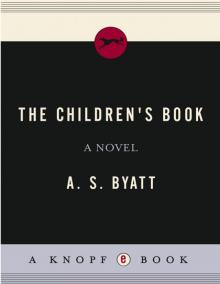 The Children's Book
The Children's Book Babel Tower
Babel Tower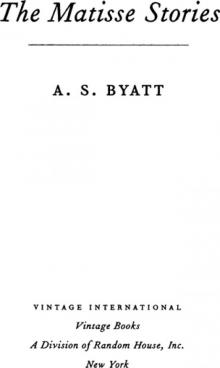 The Matisse Stories
The Matisse Stories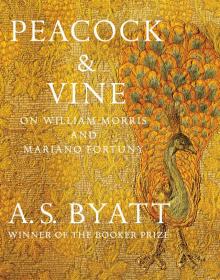 Peacock & Vine: On William Morris and Mariano Fortuny
Peacock & Vine: On William Morris and Mariano Fortuny Elementals: Stories of Fire and Ice
Elementals: Stories of Fire and Ice Sugar and Other Stories
Sugar and Other Stories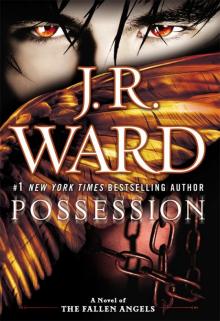 Possession
Possession Little Black Book of Stories
Little Black Book of Stories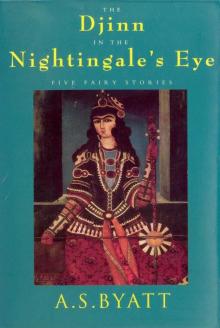 The Djinn in the Nightingale's Eye
The Djinn in the Nightingale's Eye The Virgin in the Garden
The Virgin in the Garden The Game
The Game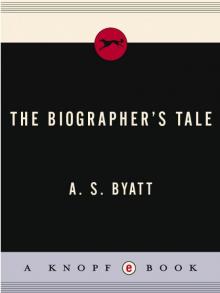 The Biographer's Tale
The Biographer's Tale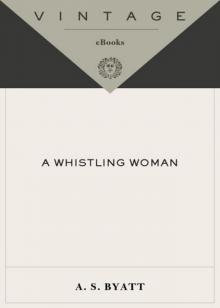 A Whistling Woman
A Whistling Woman Ragnarok
Ragnarok Angels & Insects: Two Novellas
Angels & Insects: Two Novellas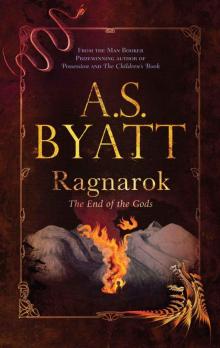 Ragnarok: the End of the Gods (Myths)
Ragnarok: the End of the Gods (Myths)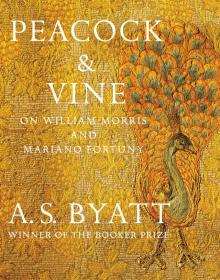 Peacock & Vine
Peacock & Vine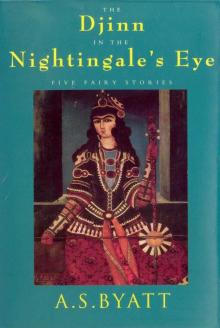 The Djinn in the Nightingale's Eye (Vintage International)
The Djinn in the Nightingale's Eye (Vintage International) Angels and Insects
Angels and Insects The Arabian Nights: Tales from a Thousand and One Nights (Modern Library Classics)
The Arabian Nights: Tales from a Thousand and One Nights (Modern Library Classics) Elementals
Elementals